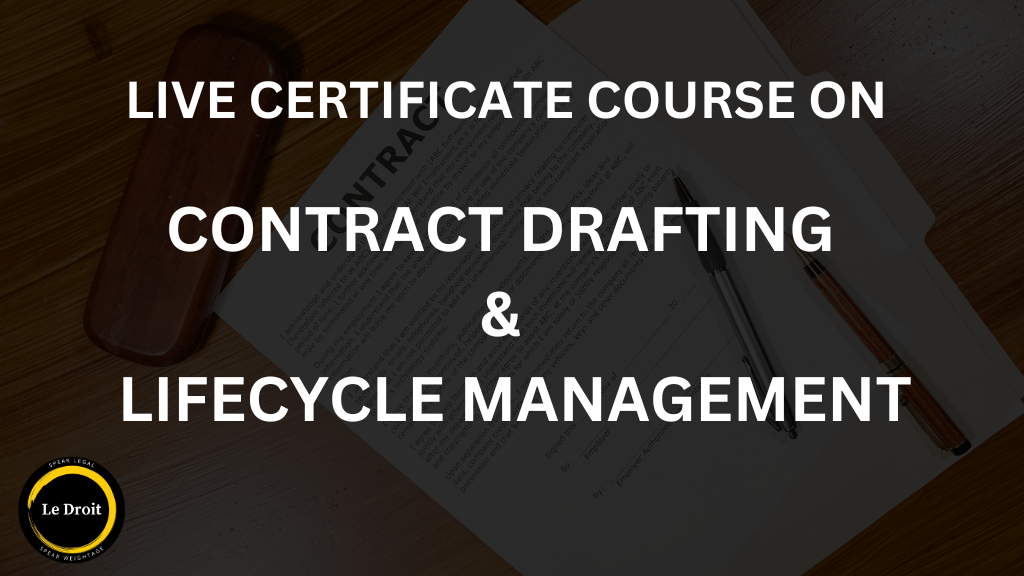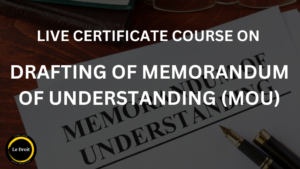Original price was: ₹6,000.00.₹2,800.00Current price is: ₹2,800.00.
Contract Drafting & Lifecycle Management Certificate Course
Live CoursesDescription
Capgemini, Cognizant, Infosys, Wipro, and all other major giants hire Contract Management Associates — but, what do these Contract Management Associates do? That’s what this course is all about! With the massive volumes of contracts being executed, companies and businesses want to keep a track of their contracts’ status at all times to avoid any legal jeopardy. For this, they rely on Contract Lifecycle Management (CLM), an end-to-end process which starts from drafting of contracts and continues with every renewal of a contract. Trust us when we say, CLM is the future! And we are here to prepare you for it!
Who Should Take This Course?
- Law Students: Looking to build a solid foundation in contract management.
- Junior Lawyers: Wanting to enhance their understanding of contract processes.
- Corporate Professionals: Involved in legal, procurement, or vendor management.
- Business Owners: Who frequently engage in contracts and want to manage them effectively.
- Anyone New to Contract Management: Looking to gain insights into how contracts are created, negotiated, and managed throughout their life cycle.
Why is CLM Important?
Contracts form the backbone of all business transactions. Managing contracts efficiently can:
- Prevent Legal Risks: Ensure compliance with legal obligations.
- Save Time and Costs: Streamline processes, avoiding delays and costly mistakes.
- Improve Business Relationships: Clear, well-managed contracts build trust between parties.
- Ensure Accountability: CLM helps track deliverables, deadlines, and performance, ensuring obligations are met.
Career Opportunities with CLM Skills
By mastering CLM, you open doors to a variety of job roles across industries, including:
- Contract Manager: Overseeing the entire contract process, from drafting to execution.
- Legal Analyst: Supporting legal teams by reviewing contracts and ensuring compliance.
- Procurement Specialist: Handling supplier contracts, managing negotiations, and ensuring vendor compliance.
- In-House Counsel: Managing all contracts within an organization, ensuring they align with company goals and legal standards.
- Compliance Officer: Monitoring contracts to ensure they adhere to legal regulations and industry standards.
- Project Manager: Managing contracts related to specific projects, ensuring that deliverables and deadlines are met.
These roles exist in industries such as corporate law, IT, finance, manufacturing, and consulting, where efficient contract management is essential to business success.
Course Start Date: 30th September, 2025
Duration: 15 Days (Contract Drafting) & 8 Days (Contract Lifecycle Management)= 23 Days
Timings: 7:30 to 8:30 pm (Contract Drafting, every Tuesday, Thursday & Saturday)
8:30 to 9:30 pm ( CLM, every weekend)
Platform: Google Meets
Also get – Internship Drafting Experience
What you’ll learn:
MODULE 1:
- What are Contracts?
- Types of Contracts:-On the basis of its enforcement
- On the basis of mode of creation
- On the basis of extent of execution
- E-Contracts and its validity.
MODULE 2:
- Standard Form of Contracts
- Importance of Standard form of contracts
- Types of Standard form of Contracts
MODULE 3:
- Registration of Contracts
- Contracts which require registration
- Contract’s which don’t require registration
- Stamping
- Attestation & Notarization
MODULE 4:
- Breach of Contract
- Common Breaches
- Damages
- Types of Damages
- Remedies for breach of contract
MODULE 5:
- Drafting of a contract:-
- Operating Clause
- Boilerplate Clauses
- Risk mitigation clauses
MODULE 6: Drafting of Contracts and Documents:
- Master Service Agreement
- Service Agreement
- Incentive Contracts& Time and Material Contracts
- Labour-Hour contracts
- Indefinite-Delivery Contracts
- Employee Contracts
- Non-Disclosure Agreements
- Memorandum of Understanding
MODULE 7: Understanding Contract Life Cycle Management
- What is CLM?
- Definition and the role it plays in businesses.
- Why managing contracts effectively is essential.
- Types of Contracts
- Commercial contracts, vendor agreements, employment contracts, etc.
- Key Stakeholders in CLM
- Roles of legal teams, procurement, and business units in managing contracts.
MODULE 8: Stages of the Contract Life Cycle
- Contract Request: Identifying the need for a contract.
- Drafting: Creating the contract with standard terms.
- Negotiation: Revising terms until both parties agree.
- Approval: Internal review and authorization.
- Execution: Signing the contract.
- Performance: Monitoring compliance and obligations.
- Amendments: Modifying the contract if needed.
- Renewal/Termination: Deciding to renew or end the contract.
MODULE 9: Why CLM is Important
- Efficiency and Cost Savings
- How effective CLM saves time and reduces risks.
- Ensuring Compliance
- How CLM ensures adherence to laws and internal policies.
- Risk Mitigation
- Identifying and addressing potential risks during the contract life cycle.
MODULE 10: Best Practices in CLM
- Centralizing Contracts
- Importance of organizing contracts in a structured way.
- Clear Communication
- Ensuring clear communication between all parties throughout the contract life cycle.
- Timely Reviews and Renewals
- Tips for setting reminders and staying ahead of contract deadlines.
MODULE 11: Challenges and Solutions in CLM
- Common Challenges for Beginners
- Lack of awareness of contract deadlines.
- Misunderstanding contract terms.
- Difficulty managing multiple contracts.
- Simple Solutions
- Setting up regular reviews.
- Communicating regularly with stakeholders to avoid missed deadlines.
- Keeping contracts accessible and organized.
MODULE 12: Real-Life Examples of CLM
- Case Study 1: Contract Renewal Management
- Example of a company successfully managing contract renewals without delays.
- Case Study 2: Contract Amendments
- Real-life situation where effective amendment management saved a project.
- Case Study 3: Ensuring Compliance
- How a company used clear processes to stay compliant with contract obligations.
Practical Learning Activities
- Contract Drafting Practice
- Learners will draft a basic contract with key terms.
- Contract Review Exercise
- A sample contract will be provided, and learners will review it for any issues.
- Scenario-Based Discussion
- Learners will discuss how to handle specific situations, such as contract renewal or dealing with a breach of contract.




